
Journal Menu
► ▼ Journal Menu-
- Brain Sciences Home
- Aims & Scope
- Editorial Board
- Reviewer Board
- Topical Advisory Panel
- Instructions for Authors
- Special Issues
- Topics
- Sections & Collections
- Article Processing Charge
- Indexing & Archiving
- Editor’s Choice Articles
- Most Cited & Viewed
- Journal Statistics
- Journal History
- Journal Awards
- Society Collaborations
- Conferences
- Editorial Office
Journal Browser
► ▼ Journal BrowserNeed Help?
Announcements
17 April 2025
Brain Sciences | Highly Cited Papers in 2023 in the Section “Neuropsychology”
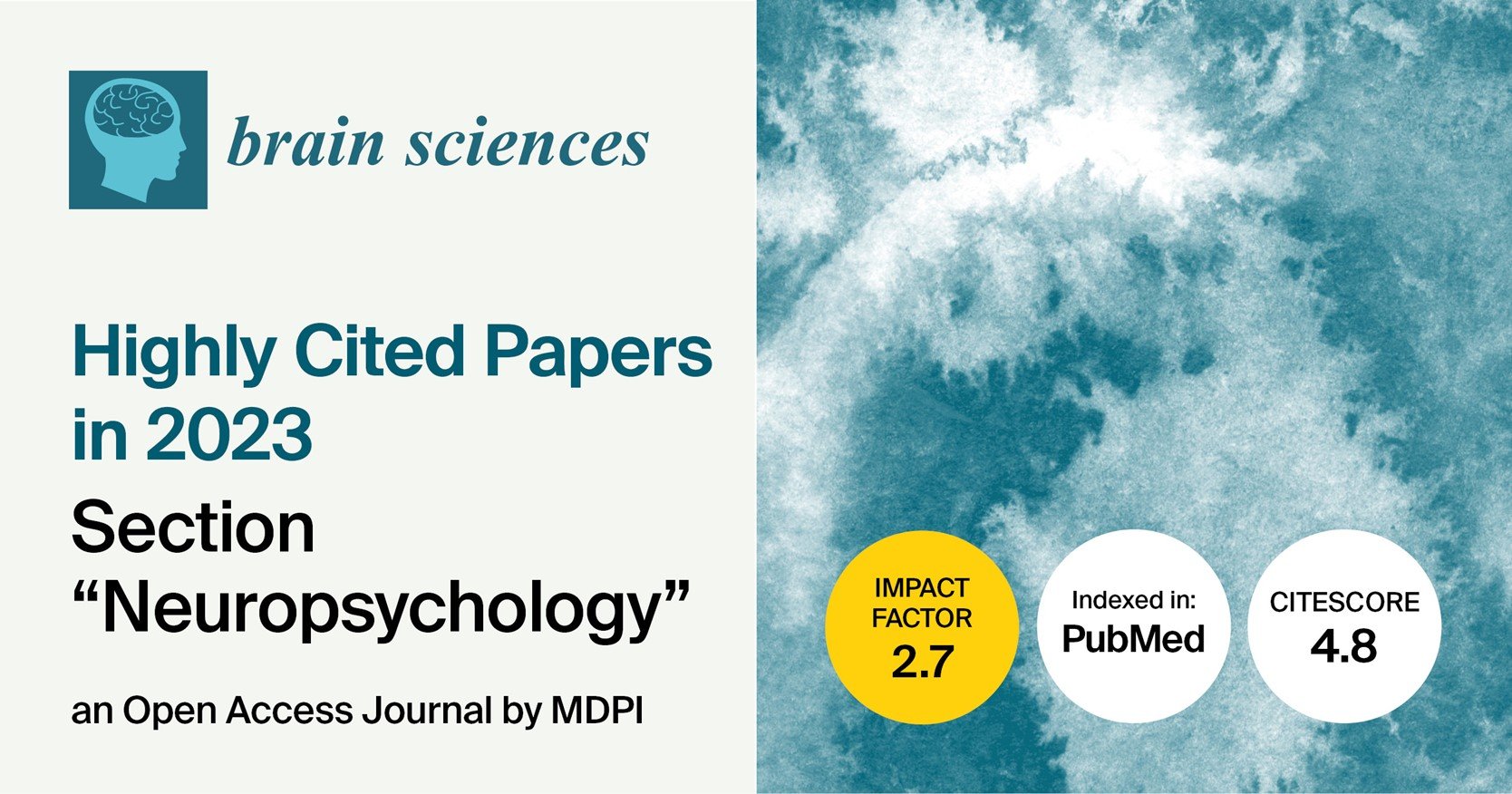
The “Neuropsychology” Section of Brain Sciences (ISSN: 2076-3425) aims to bring together research on the relationship between the brain and human cognitive, emotional, and behavioral functions. Neuropsychological testing typically evaluates individual functioning in a number of areas, including sensorimotor functions, perception, attention, spatial construction, intelligence, executive functions, memory, language, motivation, emotion, and quality of life. Articles focusing on neuropsychological functions in both healthy and disordered states and across the lifespan are encouraged. Topic areas include both developmental (e.g., ADHD, dyslexia, and other learning disabilities) and adult studies (e.g., cognitive and affective consequences of stroke and traumatic brain injury, as well as progressive conditions, such as Alzheimer’s and Huntington’s disease). Contributions dealing with the development and testing of neuropsychological interventions are also encouraged. Original empirical research based on both clinical and experimental neuropsychological paradigms, as well as systematic reviews, meta-analyses, and theoretical articles, is envisaged. Case studies illustrating important questions about brain–behavior relationships will also be considered.
As all of the articles published in our journal are of an open access format, you have free and unlimited access to the full texts. We welcome you to read our most highly cited papers published in 2023, listed below.
1. “The Association between COVID-19 Related Anxiety, Stress, Depression, Temporomandibular Disorders, and Headaches from Childhood to Adulthood: A Systematic Review”
by Giuseppe Minervini, Rocco Franco, Maria Maddalena Marrapodi, Vini Mehta, Luca Fiorillo, Almir Badnjevi´c, Gabriele Cervino and Marco Cicciù
Brain Sci. 2023, 13(3), 481; https://doi.org/10.3390/brainsci13030481
Available online: https://www.mdpi.com/2076-3425/13/3/481
2. “GLP-1 Receptor Agonists and Related Mental Health Issues; Insights from a Range of Social Media Platforms Using a Mixed-Methods Approach”
by Davide Arillotta, Giuseppe Floresta, Amira Guirguis, John Martin Corkery, Valeria Catalani, Giovanni Martinotti, Stefano L. Sensi and Fabrizio Schifano
Brain Sci. 2023, 13(11), 1503; https://doi.org/10.3390/brainsci13111503
Available online: https://www.mdpi.com/2076-3425/13/11/1503
3. “Toxicity of Synthetic Cannabinoids in K2/Spice: A Systematic Review”
by Mariana Campello de Oliveira, Mariana Capelo Vides, Dângela Layne Silva Lassi, Julio Torales, Antonio Ventriglio, Henrique Silva Bombana, Vilma Leyton, Cintia de Azevedo-Marques Périco, André Brooking Negrão, André Malbergier et al.
Brain Sci. 2023, 13(7), 990; https://doi.org/10.3390/brainsci13070990
Available online: https://www.mdpi.com/2076-3425/13/7/990
4. “Brain Correlates of Eating Disorders in Response to Food Visual Stimuli: A Systematic Narrative Review of FMRI Studies”
by Alessia Celeghin, Sara Palermo, Rebecca Giampaolo, Giulia Di Fini, Gabriella Gandinoand and Cristina Civilotti
Brain Sci. 2023, 13(3), 465; https://doi.org/10.3390/brainsci13030465
Available online: https://www.mdpi.com/2076-3425/13/3/465
5. “Enhanced Skills Training in Affective and Interpersonal Regulation (ESTAIR): A New Modular Treatment for ICD-11 Complex Posttraumatic Stress Disorder (CPTSD)”
by Thanos Karatzias, Edel Mc Glanaghy and Marylene Cloitre
Brain Sci. 2023, 13(9), 1300; https://doi.org/10.3390/brainsci13091300
Available online: https://www.mdpi.com/2076-3425/13/9/1300
6. “Neurocognitive Deficits in First-Episode and Chronic Psychotic Disorders: A Systematic Review from 2009 to 2022”
by Nadja Tschentscher, Christian F. J. Woll, Julia C. Tafelmaier, Dominik Kriesche, Julia C. Bucher, Rolf R. Engel and Susanne Karch
Brain Sci. 2023, 13(2), 299; https://doi.org/10.3390/brainsci13020299
Available online: https://www.mdpi.com/2076-3425/13/2/299
2 April 2025
MDPI INSIGHTS: The CEO's Letter #21 - Annual Report, Swiss Consortium, IWD, ICARS, Serbia

Welcome to the MDPI Insights: The CEO's Letter.
In these monthly letters, I will showcase two key aspects of our work at MDPI: our commitment to empowering researchers and our determination to facilitating open scientific exchange.
Opening Thoughts

MDPI Releases 2024 Annual Achievements Report
I’m pleased to share the release of MDPI’s 2024 Annual Achievements Report, which reflects our commitment to efficiency, transparency, and excellence in scholarly communication. The report showcases key themes related to our growth (highlighting our workforce expansion, new offices, journal milestones), excellence (editorial and publishing advancements), people (talent development and training), and community (partnerships, conferences, and outreach).
MDPI continues to build connections and drive scientific progress
Our mission remains clear: to support researchers worldwide by delivering an efficient, high-quality publishing experience while strengthening the global Open Access (OA) movement.
Advancing Open Access: A Global Knowledge Hub
In 2024, we published 238,000 peer-reviewed OA articles, reaching over 25 million downloads. This reinforces MDPI’s role as a global knowledge hub, breaking down barriers to access and ensuring that high-quality research is freely available to everyone. As part of the OA movement, we are actively democratizing knowledge, making scientific advancements accessible to researchers, policymakers, educators, and the public, without the restrictions of traditional paywalls.
Expanding our Workforce and Strengthening Research Integrity
Our global presence grew in 2024 with the opening of a new Seoul office, and our workforce expanded to 6,650 staff across 21 offices. This reflects our continued growth mindset and investment in global accessibility. We also continued to take a proactive stance on our commitment to research integrity, tripling our team in this area and joining STM’s Integrity Hub and United2Act. This means more rigorous quality control, stronger safeguards, and collaboration with global initiatives to detect and combat unethical publishing practices at an industry level. Our growth is about reinforcing our role as a trusted, ethical, and accessible publishing platform for researchers worldwide.
Growing Partnerships and Impact in Scholarly Communication
MDPI’s partnerships continue to thrive, with over 900 institutional collaborations, including a landmark agreement with ZB MED in Germany, covering more than 100 universities. Additionally, more than 90% of evaluated MDPI journals have been accepted into Web of Science, including 60 new acceptances in 2024, with nearly 300 journals expected to receive a Journal Impact Factor in 2025. In the same period, 37 MDPI journals were accepted into Scopus, bringing our total indexed titles to 306. Most importantly, 95% of authors rate their experience with MDPI as excellent or good – an achievement that underscores our dedication to serving the research community.
I encourage you to read through our Annual Report, which highlights these milestones and our vision for the future. Thank you for being part of MDPI’s journey in advancing open science.
Impactful Research

MDPI Renews Partnership with CSAL to Support Swiss Universities
I am pleased to announce the renewal of our partnership with the Consortium of Swiss Academic Libraries (CSAL) for 2025. This extension reinforces MDPI's dedication to advancing open science through transparency, efficiency, and collaboration.
Our renewed agreement with CSAL strengthens support for Swiss universities, ensuring that gold open access publishing remains both accessible and affordable for researchers across Switzerland. Among the institutions participating in this agreement are ETH Zurich and EPFL Lausanne, along with 20 other leading institutions, further expanding the reach and impact of our collaborative efforts.
To date, over 3.9 million researchers have published their findings in MDPI journals, a testament to our role in enhancing Switzerland's position as a hub for university education and research.
Inside MDPI

Celebrating International Women's Day: Accelerating Action
In honour of International Women's Day, MDPI embraced the theme “Accelerate Action,” a global call to advance women's progress by implementing effective strategies and resources. As part of our commitment, we highlighted how open access publishing empowers female voices in research and academia.
Throughout March, we featured original blogs authored by MDPI’s female contributors, showcasing the successes of our journals and employees, and addressing pressing topics such as women's health.
“Open Access supports women in education”
Women Accelerating Action Outside of MDPI

MDPI employee Ana Zdravkovic is accelerating action outside of her MDPI role as a Production Assistant. Working with like-minded women at the award-winning Belgrade-based organization UZOR OsnaŽene (meaning ‘empowered women’), they identify serious flaws in cybersecurity, and help protect women and children against online predators by providing evidence to improve legislation and laws around cyber-attacks.
In this article, we interview Ana, celebrating the important and inspiring work that she and the organisation do.
How Open Access Supports Women in Education

Every day, women and girls face barriers in education or career progression. This is caused by a range of factors, including social expectations, poverty, and poor infrastructure.
Quality opportunities and participation in the education system by women is essential to achieving equality and fulfilling their human rights.
Here, we examine how Open Access supports women in education by removing barriers and ensuring that vital research is accessible.
Recent Advancements in Research on Endometriosis

March is Endometriosis Action Month. Endometriosis is a medical condition affecting women and young girls of reproductive age, often causing symptoms such as severe pelvic pain, irregular periods, and infertility.
More research on endometriosis is still urgently needed.
This research will help develop efficient diagnoses and better treatment for those struggling with the condition.
In this article, we explore what endometriosis is and discuss the latest research advancements on the disease.
We also curated a selection of MDPI journals, articles, and Special Issues focusing on gender equity, women in the workplace, and women’s health. Find out more about these by visiting our IWD – Accelerate Action landing page.
As I reflect on the month of March and International Women’s Day, I would like to take a moment to recognize and thank all of the incredible women at MDPI for your dedication to democratizing knowledge and shaping open access. Your contributions are invaluable, and they continue to shape the future of MDPI.
Coming Together for Science

The International Conference on Advanced Remote Sensing (ICARS 2025)
The International Conference on Advanced Remote Sensing (ICARS 2025) took place from 26–28 March 2025, in Barcelona, Spain. It was chaired by Prof. Dr. Fabio Tosti from the Faringdon Research Centre for Non-Destructive Testing and Remote Sensing (UK), Prof. Dr. Andrea Benedetto from University Roma Tre (Italy), and Prof. Dr. Luis Ángel Ruiz from Universitat Politècnica de València (UPV, Spain).
Over three days, the conference explored innovations in Earth and environmental sciences, engineering advancements, and practical applications in biological and agricultural fields.


I am pleased to share that the 1st edition of ICARS 2025 was a great success, with 133 attendees out of 146 registrations. The event featured 43 short talks, 64 posters, and 103 accepted abstracts, along with nine keynote speakers and a major panel with five expert panellists.
Over 60 attendees joined the conference dinner, and the event received outstanding feedback.
The main goal of ICARS2025 was to cover how advanced remote sensing technologies are transforming our approach to global challenges.

Awards
Four awards were presented at the conclusion of the conference, sponsored by the journal Remote Sensing: Best Poster Award (€400), Best Oral Presentation Award (€400), and two Early Career Researcher Awards (1st prize: €600 and 2nd prize: €200).
Thank you to our Partnering Societies
We are grateful for the support of our four partnering societies and nine media partners, who played an important role in promoting the conference. Special thanks to our partnering societies: the European Federation of Geologists (EFG), Geoscience Energy Society of Great Britain (GESGB), Asociación Española de Teledetección (AET) – the Spanish Association of Remote Sensing, and the International Society for Digital Earth (ISDE).
Upcoming In-Person Event

31 March–2 April 2025
Plants 2025: From Seeds to Food Security
Location: Barcelona, Spain
This event will gather plant scientists to discuss the latest research on how to feed a growing population while maintaining a sustainable agro-ecosystem.
Find more upcoming MDPI events here.
Closing Thoughts

MDPI Serbia Salon 2025: A Gathering of Academic Excellence
On Tuesday, 18 March, we successfully concluded our first MDPI Serbia Salon in Belgrade. This event provided a great opportunity to showcase MDPI’s achievements, strengthen connections with the Serbian academic community, and highlight our role as the largest publisher in Serbia. We were honoured to welcome Prof. Dr. Sergej M. Ostojić, Editor-in-Chief of MDPI journal Clinical Bioenergetics, as a guest speaker.

Over the past five years, MDPI has experienced continuous growth in Serbia, with an increasing number of publications, an expansion of Editorial Board memberships, and a greater number of active peer reviewers. The Salon allowed us to express our thanks to the Serbian research community while gathering feedback from attendees representing several major universities.
Discussion topics

As part of the event, I delivered an opening speech highlighting MDPI’s achievements and direction.
The event featured presentations from MDPI colleagues, including discussions on open science, publishing ethics, and our achievements in Serbia.
A special thank-you to all our MDPI presenters, panellists, and organizers who made his event a success. I hope the MDPI Serbia Salon becomes a tradition for years to come, creating connections within the Serbian research community.
Visit to the Science Fund of Serbia and The Ministry of Science
During my visit to Belgrade, I had the opportunity to join my colleagues Emir Ramadani (Operations Manager) and Nevena Blagojev (Journal Relations Manager) in meetings with the Science Fund of Serbia and the Ministry of Science, where we received strong support for our work in Serbia.
Both organizations highly value our presence in and commitment to Serbia, where we employ over 640 staff across our two offices in Belgrade and Novi Sad. We take great pride in creating job opportunities and supporting the community in Serbia.

“There’s a lot of exciting activity happening in MDPI Serbia”
Speaking with our Serbian Colleagues

Finally, I had the opportunity to speak with our Serbian colleagues about our initiatives to expand and to improve our marketing & communication and public relations activities.
It was great to have an open discussion with colleagues – both in person and with the hundreds who joined online.
This visit to Belgrade had been a long time coming for me. Serbia is our largest operation in Europe and there’s a lot of exciting activity happening in MDPI Serbia, including the launch of a new office floor in Novi Sad and the growth and expansion of our teams.
I look forward to returning soon and continuing to support our colleagues across our Serbian offices.
Chief Executive Officer
MDPI AG
1 April 2025
Meet us at the 11th Congress of the European Academy of Neurology, 21–24 June 2025, Helsinki, Finland

MDPI will be attending the 11th Congress of the European Academy of Neurology, which will be held in Helsinki, Finland, from 21 to 24 June 2025. The EAN Congress 2025 is organized by the European Academy of Neurology. Its exciting overarching theme of neurology within society sets the scene for an unforgettable congress and is highly relevant to our practice as neurologists, given our crucial role as clinicians—and in many cases neuroscientists—in addressing the huge burden of neurological disorders. To have an impact, we must work with many other stakeholders and specialties, and we look forward to welcoming many of them to the home of neurology in 2025. As usual, the overarching theme will serve as a common thread throughout all the invited content of our congress, from workshops to plenary sessions.
The following MDPI journals will be represented:
- Brain Sciences;
- JCM;
- CTN;
- Neurology International;
- Neuroglia;
- Cells;
- Diagnostics;
- Neurosci;
- Psychiatry International;
- Antioxidants;
- Biomolecules;
- Genes;
- IJTM;
- Vaccines.
If you plan to attend the conference, please visit our booth #E48. Our delegates look forward to meeting you in person and answering any questions that you may have. For more information about the conference, please visit the following website: https://www.ean.org/congress2025.
1 April 2025
Recruiting Volunteer Reviewers for Brain Sciences
Peer reviewing is an essential part of the publication process, ensuring that Brain Sciences (ISSN: 2076-3425) maintains its high standards for the quality of published papers. We wish to recruit expert reviewers to help uphold the quality and efficiency of Brain Sciences.
To qualify as a reviewer, applicants must have published around eight papers related to the topics covered by Brain Sciences in the last 5 years and hold a Ph.D. degree. You may check “Peer Review” in the MDPI Editorial Process for details related to reviewers by using the following link: https://www.mdpi.com/editorial_process. For example, reviewers should hold no conflicts of interest with any of the authors, reviewers should hold work for an official and recognized academic institution, etc.
We will extend the following benefits to reviewers:
- Reviewers will receive a discount voucher code based on review quality;
- Reviewers will be included in the journal’s annual acknowledgment of reviewers (example: https://www.mdpi.com/about/announcements/10579);
- Reviewers will be considered for the Brain Sciences Outstanding Reviewer Award, details of which can be found at https://www.mdpi.com/journal/brainsci/awards/2937;
- Reviewers can build their profile on Publons and have their reviewing activity automatically added for participating journals, and Publons profiles can be integrated into ORCID.
For more information, please visit the following link: https://www.mdpi.com/reviewers.
If you are interested in this position, please submit your application at https://susy.mdpi.com/volunteer/journals/review.
We hope that you will join our team of reviewers. After your registration is approved, you will see a list of manuscripts for recruiting reviewers.
If you have any other questions, please contact the Brain Sciences Editorial Office. We look forward to hearing from you.
20 March 2025
Brain Sciences | Highly Cited Papers in 2023 in the “Sensory and Motor Neuroscience” Section
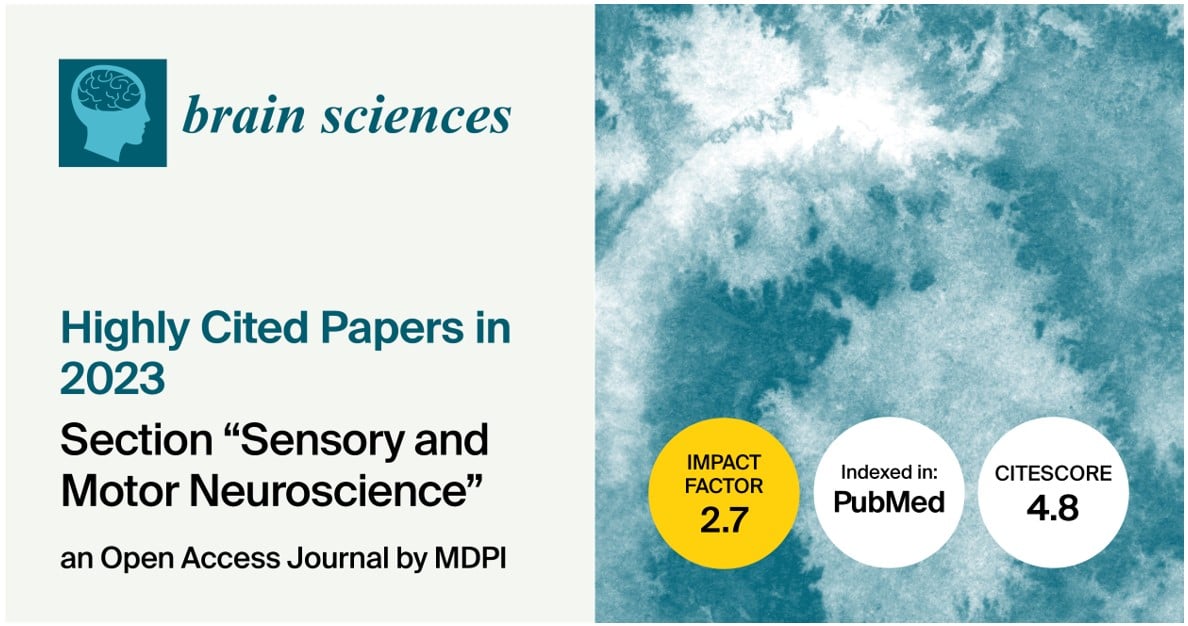
The “Sensory and Motor Neuroscience” Section in Brain Sciences (ISSN: 2076-3425) brings together research on the functioning of our sensory and movement systems. The Section explores applications of the anatomical and functional neurobiology of motor, sensorimotor, vestibular, and somatosensory systems across the lifespan and in aging.
As all of the articles published in our journal are of an open access format, you have free and unlimited access to the full texts. We welcome you to read our most highly cited papers published in 2023, listed below:
1. “Artificial Intelligence Frameworks to Detect and Investigate the Pathophysiology of Spaceflight Associated Neuro-Ocular Syndrome (SANS)”
by Joshua Ong, Ethan Waisberg, Mouayad Masalkhi, Sharif Amit Kamran, Kemper Lowry, Prithul Sarker, Nasif Zaman, Phani Paladugu, Alireza Tavakkoli and Andrew G. Lee
Brain Sci. 2023, 13(8), 1148; https://doi.org/10.3390/brainsci13081148
Available online: https://www.mdpi.com/2076-3425/13/8/1148
2. “Diagnosis and Management of Seronegative Myasthenia Gravis: Lights and Shadows”
by Claudia Vinciguerra, Liliana Bevilacqua, Antonino Lupica, Federica Ginanneschi, Giuseppe Piscosquito, Nicasio Rini, Alessandro Rossi, Paolo Barone, Filippo Brighina and Vincenzo Di Stefano
Brain Sci. 2023, 13(9), 1286; https://doi.org/10.3390/brainsci13091286
Available online: https://www.mdpi.com/2076-3425/13/9/1286
3. “Machine Learning for Early Diagnosis of ATTRv Amyloidosis in Non-Endemic Areas: A Multicenter Study from Italy”
by Vincenzo Di Stefano, Francesco Prinzi, Marco Luigetti, Massimo Russo, Stefano Tozza, Paolo Alonge, Angela Romano, Maria Ausilia Sciarrone, Francesca Vitali, Anna Mazzeo et al.
Brain Sci. 2023, 13(5), 805; https://doi.org/10.3390/brainsci13050805
Available online: https://www.mdpi.com/2076-3425/13/5/805
4. “Low Levels of Adenosine and GDNF Are Potential Risk Factors for Parkinson’s Disease with Sleep Disorders”
by Li Wang, Zheng Gao, Gang Chen, Deqin Geng and Dianshuai Gao
Brain Sci. 2023, 13(2), 200; https://doi.org/10.3390/brainsci13020200
Available online: https://www.mdpi.com/2076-3425/13/2/200
5. “Resolvin D2 Reduces Chronic Neuropathic Pain and Bone Cancer Pain via Spinal Inhibition of IL-17 Secretion, CXCL1 Release and Astrocyte Activation in Mice”
by Jun Pang, Pengfei Xin, Ying Kong, Zhe Wang and Xiaopeng Wang
Brain Sci. 2023, 13(1), 152; https://doi.org/10.3390/brainsci13010152
Available online: https://www.mdpi.com/2076-3425/13/1/152
4 March 2025
Brain Sciences | Highly Cited Papers from 2023 in the “Neuropsychiatry” Section
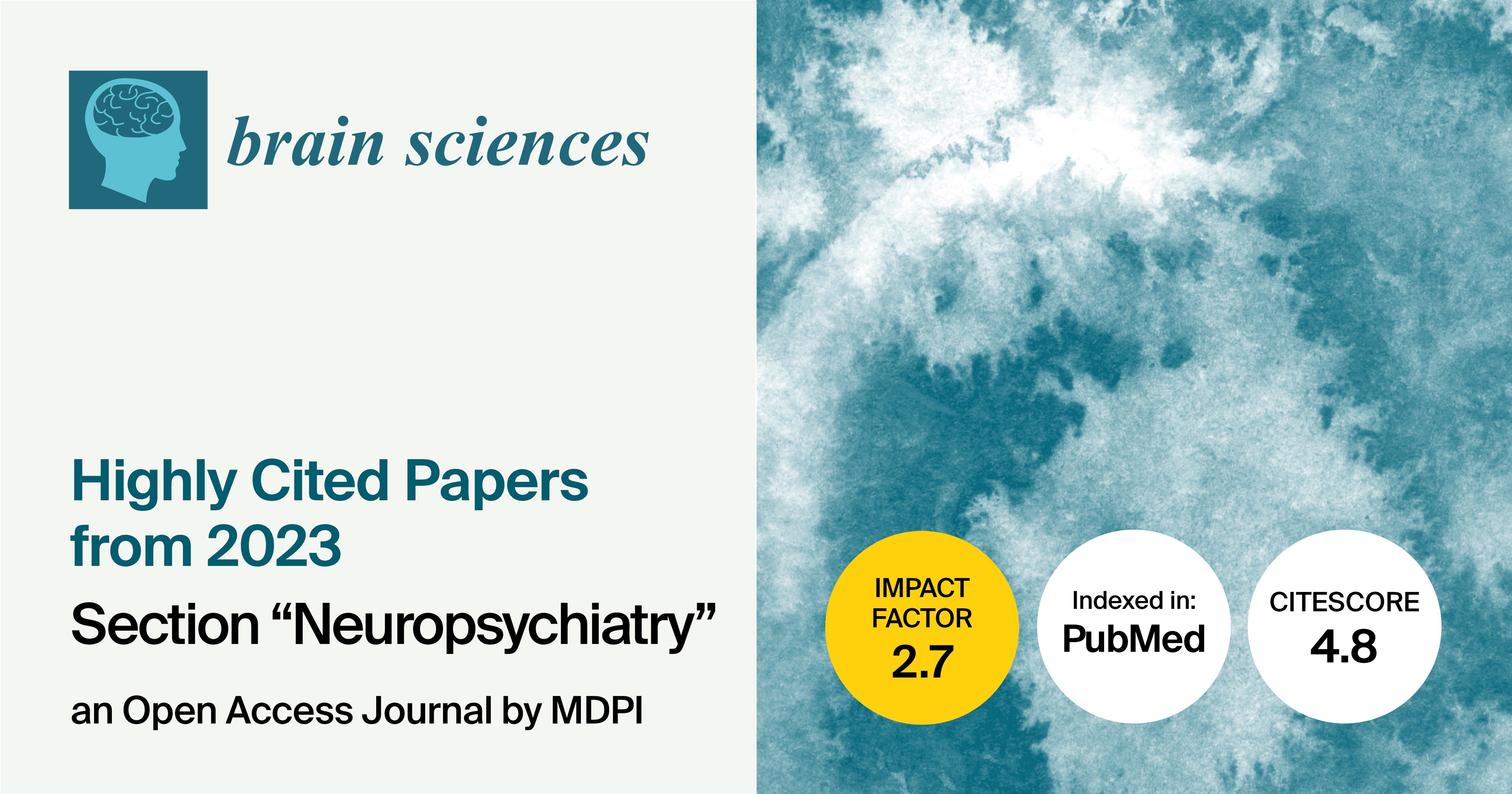
The “Neuropsychiatry” Section gathers the best available scientific evidence to guide clinical practice in the treatment of psychiatric illnesses. Submissions of original articles and reviews which advance our understanding of the etiology, course, and treatment of psychiatric illnesses are invited. Papers reporting sound evidence-based practices which provide safeguards against reporting bias and promote the reproducibility of study procedures and the replicability of results, for example through the preregistration of study hypotheses, are especially welcome.
As all of the articles published in our journal are of an open access format, you have free and unlimited access to the full texts. We invited you to read our most highly cited papers published in 2023, which are listed below.
1. “Endocannabinoid System and Exogenous Cannabinoids in Depression and Anxiety: A Review”
by Ahmed Hasbi, Bertha K. Madras and Susan R. George
Brain Sci. 2023, 13(2), 325; https://doi.org/10.3390/brainsci13020325
Available online: https://www.mdpi.com/2076-3425/13/2/325
2. “The Role of Brain-Derived Neurotrophic Factor (BDNF) in Diagnosis and Treatment of Epilepsy, Depression, Schizophrenia, Anorexia Nervosa and Alzheimer’s Disease as Highly Drug-Resistant Diseases: A Narrative Review”
by Aleksandra Gliwińska, Justyna Czubilińska-Łada, Gniewko Więckiewicz, Elżbieta Świętochowska, Andrzej Badeński, Marta Dworak and Maria Szczepańska
Brain Sci. 2023, 13(2), 163; https://doi.org/10.3390/brainsci13020163
Available online: https://www.mdpi.com/2076-3425/13/2/163
3. “Application of Antipsychotic Drugs in Mood Disorders”
by Janusz K. Rybakowski
Brain Sci. 2023, 13(3), 414; https://doi.org/10.3390/brainsci13030414
Available online: https://www.mdpi.com/2076-3425/13/3/414
4. “Measuring Social Camouflaging in Individuals with High Functioning Autism: A Literature Review”
by Ivan Mirko Cremone, Barbara Carpita, Benedetta Nardi, Danila Casagrande, Rossella Stagnari, Giulia Amatori and Liliana Dell’Osso
Brain Sci. 2023, 13(3), 469; https://doi.org/10.3390/brainsci13030469
Available online: https://www.mdpi.com/2076-3425/13/3/469
5. “Is It Time for a Paradigm Shift in the Treatment of Schizophrenia? The Use of Inflammation-Reducing and Neuroprotective Drugs—A Review”
by Antonino Messina, Carmen Concerto, Alessandro Rodolico, Antonino Petralia, Filippo Caraci and Maria Salvina Signorelli
Brain Sci. 2023, 13(6), 957; https://doi.org/10.3390/brainsci13060957
Available online: https://www.mdpi.com/2076-3425/13/6/957
6. “Depression in Major Neurodegenerative Diseases and Strokes: A Critical Review of Similarities and Differences among Neurological Disorders”
by Javier Pagonabarraga, Cecilio Álamo, Mar Castellanos, Samuel Díaz and Sagrario Manzano
Brain Sci. 2023, 13(2), 318; https://doi.org/10.3390/brainsci13020318
Available online: https://www.mdpi.com/2076-3425/13/2/318
7. “Brexpiprazole—Pharmacologic Properties and Use in Schizophrenia and Mood Disorders”
by Marcin Siwek, Krzysztof Wojtasik-Bakalarz, Anna Julia Krupa and Adrian Andrzej Chrobak
Brain Sci. 2023, 13(3), 397; https://doi.org/10.3390/brainsci13030397
Available online: https://www.mdpi.com/2076-3425/13/3/397
8. “Long-Term Lithium Therapy and Thyroid Disorders in Bipolar Disorder: A Historical Cohort Study”
by Boney Joseph, Nicolas A. Nunez, Vanessa Pazdernik, Rakesh Kumar, Mehak Pahwa, Mete Ercis, Aysegul Ozerdem, Alfredo B. Cuellar-Barboza, Francisco Romo-Nava, Susan L. McElroy et al.
Brain Sci. 2023, 13(1), 133; https://doi.org/10.3390/brainsci13010133
Available online: https://www.mdpi.com/2076-3425/13/1/133
9. “Epigenetic Targets in Schizophrenia Development and Therapy”
by Agnieszka Wawrzczak-Bargieła, Wiktor Bilecki and Marzena Maćkowiak
Brain Sci. 2023, 13(3), 426; https://doi.org/10.3390/brainsci13030426
Available online: https://www.mdpi.com/2076-3425/13/3/426
10. “Oxidative Stress Biomarkers among Schizophrenia Inpatients”
by Magdalena Więdłocha, Natalia Zborowska, Piotr Marcinowicz, Weronika Dębowska, Marta Dębowska, Anna Zalewska, Mateusz Maciejczyk, Napoleon Waszkiewicz and Agata Szulc
Brain Sci. 2023, 13(3), 490; https://doi.org/10.3390/brainsci13030490
Available online: https://www.mdpi.com/2076-3425/13/3/490
11. “Research and Diagnostic Algorithmic Rules (RADAR) and RADAR Plots for the First Episode of Major Depressive Disorder: Effects of Childhood and Recent Adverse Experiences on Suicidal Behaviors, Neurocognition and Phenome Features”
by Michael Maes and Abbas F. Almulla
Brain Sci. 2023, 13(5), 714; https://doi.org/10.3390/brainsci13050714
Available online: https://www.mdpi.com/2076-3425/13/5/714
12. “Comorbidity and Overlaps between Autism Spectrum and Borderline Personality Disorder: State of the Art”
by Liliana Dell’Osso, Ivan Mirko Cremone, Benedetta Nardi, Valeria Tognini, Lucrezia Castellani, Paola Perrone, Giulia Amatori and Barbara Carpita
Brain Sci. 2023, 13(6), 862; https://doi.org/10.3390/brainsci13060862
Available online: https://www.mdpi.com/2076-3425/13/6/862
13. “Regulatory Clearance and Approval of Therapeutic Protocols of Transcranial Magnetic Stimulation for Psychiatric Disorders”
by Gonçalo Cotovio, Fabiana Ventura, Daniel Rodrigues da Silva, Patrícia Pereira and Albino J. Oliveira-Maia
Brain Sci. 2023, 13(7), 1029; https://doi.org/10.3390/brainsci13071029
Available online: https://www.mdpi.com/2076-3425/13/7/1029
14. “Rumination as a Transdiagnostic Phenomenon in the 21st Century: The Flow Model of Rumination”
by Stephanie M. Y. Wong, Eric Y. H. Chen, Michelle C. Y. Lee, Y. N. Suen and Christy L. M. Hui
Brain Sci. 2023, 13(7), 1041; https://doi.org/10.3390/brainsci13071041
Available online: https://www.mdpi.com/2076-3425/13/7/1041
15. “Lethal Lust: Suicidal Behavior and Chemsex—A Narrative Review of the Literature”
by Martina Strasser, Theresa Halms, Tobias Rüther, Alkomiet Hasan and Marcus Gertzen
Brain Sci. 2023, 13(2), 174; https://doi.org/10.3390/brainsci13020174
Available online: https://www.mdpi.com/2076-3425/13/2/174
16. “Breathwork Interventions for Adults with Clinically Diagnosed Anxiety Disorders: A Scoping Review”
by Blerida Banushi, Madeline Brendle, Anya Ragnhildstveit, Tara Murphy, Claire Moore, Johannes Egberts and Reid Robison
Brain Sci. 2023, 13(2), 256; https://doi.org/10.3390/brainsci13020256
Available online: https://www.mdpi.com/2076-3425/13/2/256
17. “Depression Is Associated with an Increased Risk of Subsequent Cancer Diagnosis: A Retrospective Cohort Study with 235,404 Patients”
by Hannah Mössinger and Karel Kostev
Brain Sci. 2023, 13(2), 302; https://doi.org/10.3390/brainsci13020302
Available online: https://www.mdpi.com/2076-3425/13/2/302
18. “Novel Compounds in the Treatment of Schizophrenia—A Selective Review”
by Evangelia Maria Tsapakis, Kalliopi Diakaki, Apostolos Miliaras and Konstantinos N. Fountoulakis
Brain Sci. 2023, 13(8), 1193; https://doi.org/10.3390/brainsci13081193
Available online: https://www.mdpi.com/2076-3425/13/8/1193
19. “Abnormalities of EEG Functional Connectivity and Effective Connectivity in Children with Autism Spectrum Disorder”
by Xinling Geng, Xiwang Fan, Yiwen Zhong, Manuel F. Casanova, Estate M. Sokhadze, Xiaoli Li and Jiannan Kang
Brain Sci. 2023, 13(1), 130; https://doi.org/10.3390/brainsci13010130
Available online: https://www.mdpi.com/2076-3425/13/1/130
20. “The Comorbidity of Depression and Anxiety Symptoms in Tinnitus Sufferers: A Network Analysis”
by Xuemin Chen, Lei Ren, Xinmiao Xue, Ning Yu, Peng Liu, Weidong Shen, Hanwen Zhou, Ben Wang, Jingcheng Zhou, Shiming Yang et al.
Brain Sci. 2023, 13(4), 583; https://doi.org/10.3390/brainsci13040583
Available online: https://www.mdpi.com/2076-3425/13/4/583
21. “The Role of Ketamine in the Treatment of Bipolar Depression: A Scoping Review”
by Muhammad Youshay Jawad, Saleha Qasim, Menglu Ni, Ziji Guo, Joshua D. Di Vincenzo, Giacomo d’Andrea, Aniqa Tabassum, Andrea Mckenzie, Sebastian Badulescu, Iria Grande et al.
Brain Sci. 2023, 13(6), 909; https://doi.org/10.3390/brainsci13060909
Available online: https://www.mdpi.com/2076-3425/13/6/909
27 February 2025
More than 300 MDPI Journals Indexed in Web of Science
MDPI is pleased to share a significant milestone in its mission to advance scholarly research and promote the dissemination of knowledge—300+ MDPI journals are now indexed in Web of Science (WoS). This milestone highlights the global recognition, interdisciplinary impact and enhanced visibility of our journals. It also reflects our adherence to rigorous editorial standards, scientific integrity, and our mission to foster open scientific exchange in all forms, across all disciplines.

To explore the full list of our journals indexed in WoS, please visit https://www.mdpi.com/about/journals/wos. Beyond expanding the coverage of our publications in the leading academic databases, we are dedicated to ensuring that our journals are included in as many scope-specific databases as possible. This increases the visibility of our authors’ work and extends the reach of their significant data.
This milestone would not have been possible without the efforts and expertise of our academic editors, reviewers and authors. Their commitment and collaboration have been instrumental in creating an inclusive, accessible, and impactful publishing platform. We also extend our gratitude to the global research community for their trust as we continue to break new ground in academic publishing. This milestone is not just a celebration of MDPI’s progress but also recognition of the collective strides made by researchers worldwide.
As we celebrate this remarkable accomplishment, MDPI remains steadfast in its commitment to open access publishing and ensuring that high-quality research reaches and inspires a global audience.
25 February 2025
Brain Sciences | Highly Cited Papers in 2023 in the “Neurorehabilitation” Section
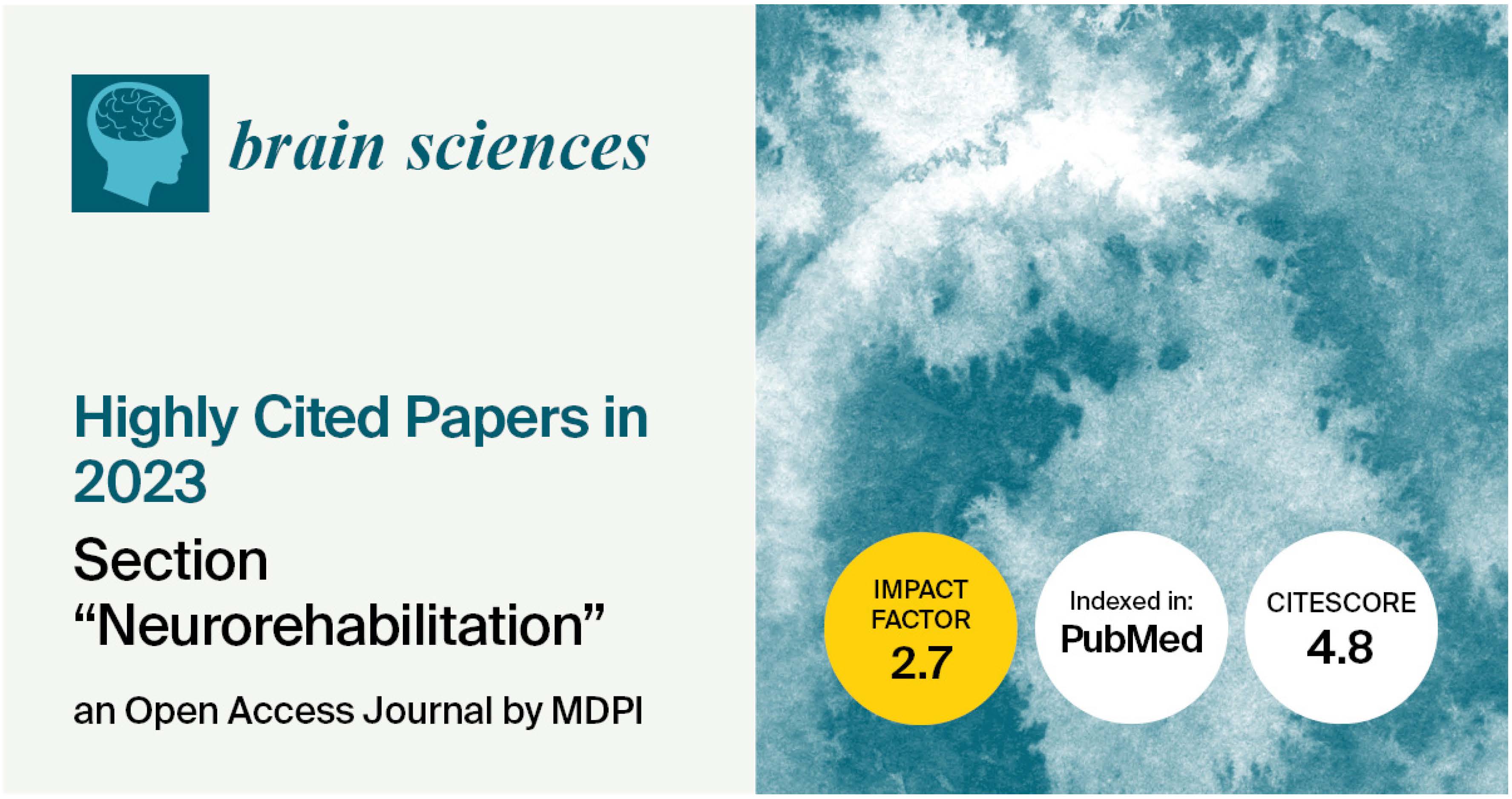
The “Neurorehabilitation” Section publishes high-quality research focused on both conventional and innovative training approaches aimed at restoring neurological function and improving quality of life in individuals with neurological impairments. This Section welcomes studies exploring evidence-based rehabilitation strategies, including robotics, virtual reality, telerehabilitation, and other advanced training paradigms that enhance motor and cognitive recovery.
As all of the articles published in our journal are of open access format, you have free and unlimited access to the full texts. We welcome you to read our most highly cited papers published in 2023, listed below.
1. “A Comprehensive Review of Physical Therapy Interventions for Stroke Rehabilitation: Impairment-Based Approaches and Functional Goals”
by Jawaria Shahid, Ayesha Kashif and Muhammad Kashif Shahid
Brain Sci. 2023, 13(5), 717; https://doi.org/10.3390/brainsci13050717
Available online: https://www.mdpi.com/2076-3425/13/5/717
2. “Balance Rehabilitation through Robot-Assisted Gait Training in Post-Stroke Patients: A Systematic Review and Meta-Analysis”
by Alberto Loro, Margherita Beatrice Borg, Marco Battaglia, Angelo Paolo Amico, Roberto Antenucci, Paolo Benanti, Michele Bertoni, Luciano Bissolotti, Paolo Boldrini, Donatella Bonaiuti et al.
Brain Sci. 2023, 13(1), 92; https://doi.org/10.3390/brainsci13010092
Available online: https://www.mdpi.com/2076-3425/13/1/92
3. “Noninvasive Brain Stimulation for Neurorehabilitation in Post-Stroke Patients”
by Kun-Peng Li, Jia-Jia Wu, Zong-Lei Zhou, Dong-Sheng Xu, Mou-Xiong Zheng, Xu-Yun Hua and Jian-Guang Xu
Brain Sci. 2023, 13(3), 451; https://doi.org/10.3390/brainsci13030451
Available online: https://www.mdpi.com/2076-3425/13/3/451
4. “An Overview of the Body Schema and Body Image: Theoretical Models, Methodological Settings and Pitfalls for Rehabilitation of Persons with Neurological Disorders”
by Davide Sattin, Chiara Parma, Christian Lunetta, Aida Zulueta, Jacopo Lanzone, Luca Giani, Marta Vassallo, Mario Picozzi and Eugenio Agostino Parati
Brain Sci. 2023, 13(10), 1410; https://doi.org/10.3390/brainsci13101410
Available online: https://www.mdpi.com/2076-3425/13/10/1410
5. “Motor-Related Mu/Beta Rhythm in Older Adults: A Comprehensive Review”
by Takashi Inamoto, Masaya Ueda, Keita Ueno, China Shiroma, Rin Morita, Yasuo Naito and Ryouhei Ishii
Brain Sci. 2023, 13(5), 751; https://doi.org/10.3390/brainsci13050751
Available online: https://www.mdpi.com/2076-3425/13/5/751
6. “Cerebrolysin in Patients with TBI: Systematic Review and Meta-Analysis”
by Konrad Jarosz, Klaudyna Kojder, Agata Andrzejewska, Joanna Solek-Pastuszka and Anna Jurczak
Brain Sci. 2023, 13(3), 507; https://doi.org/10.3390/brainsci13030507
Available online: https://www.mdpi.com/2076-3425/13/3/507
21 February 2025
Brain Sciences | Highly Cited Papers from 2023 in the “Neuropharmacology and Neuropathology” Section
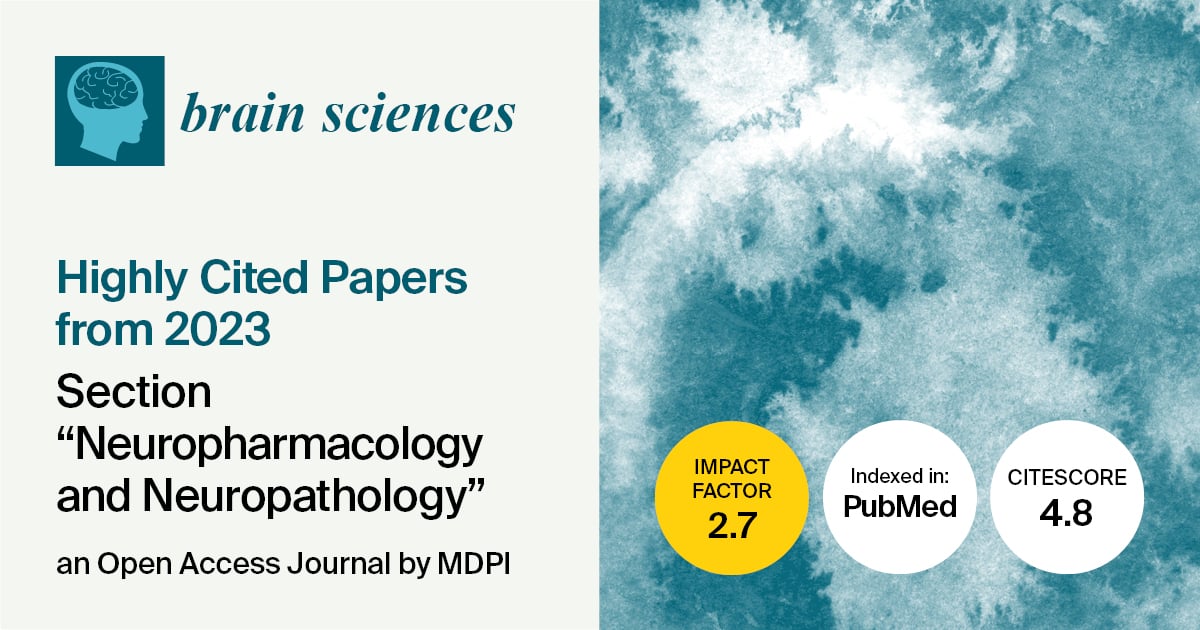
As all of the articles published in our journal are of an open access format, you have free and unlimited access to the full texts. We invite you to read our most highly cited papers published in 2023, which are listed below.
1. “Advances in Glioblastoma Therapy: An Update on Current Approaches”
by Ramcharan Singh Angom, Naga Malleswara Rao Nakka and Santanu Bhattacharya
Brain Sci. 2023, 13(11), 1536; https://doi.org/10.3390/brainsci13111536
Available online: https://www.mdpi.com/2076-3425/13/11/1536
2. “Therapeutic Strategies to Ameliorate Neuronal Damage in Epilepsy by Regulating Oxidative Stress, Mitochondrial Dysfunction, and Neuroinflammation”
by Sahithi Madireddy and Samskruthi Madireddy
Brain Sci. 2023, 13(5), 784; https://doi.org/10.3390/brainsci13050784
Available online: https://www.mdpi.com/2076-3425/13/5/784
3. “A Comprehensive Review on Anti-Inflammatory Response of Flavonoids in Experimentally-Induced Epileptic Seizures”
by Shyam Sunder Rabidas, Chandra Prakash, Jyoti Tyagi, Jyoti Suryavanshi, Pavan Kumar, Jaydeep Bhattacharya and Deepak Sharma
Brain Sci. 2023, 13(1), 102; https://doi.org/10.3390/brainsci13010102
Available online: https://www.mdpi.com/2076-3425/13/1/102
4. “Animal Models of Ischemic Stroke with Different Forms of Middle Cerebral Artery Occlusion”
by Lang Zeng, Shengqi Hu, Lingcheng Zeng, Rudong Chen, Hua Li, Jiasheng Yu and Hongkuan Yang
Brain Sci. 2023, 13(7), 1007; https://doi.org/10.3390/brainsci13071007
Available online: https://www.mdpi.com/2076-3425/13/7/1007
5. “Early Brain Injury and Neuroprotective Treatment after Aneurysmal Subarachnoid Hemorrhage: A Literature Review”
by Xiaopeng Li, Lang Zeng, Xuanzhen Lu, Kun Chen, Maling Yu, Baofeng Wang and Min Zhao
Brain Sci. 2023, 13(7), 1083; https://doi.org/10.3390/brainsci13071083
Available online: https://www.mdpi.com/2076-3425/13/7/1083
6. “Perampanel in Brain Tumor-Related Epilepsy: A Systematic Review”
by Payam Damavandi Tabaee, Francesco Pasini, Gaia Fanella, Giulia Sofia Cereda, Gabriele Mainini, Jacopo C. DiFrancesco, Eugen Trinka and Simona Lattanz
Brain Sci. 2023, 13(2), 326; https://doi.org/10.3390/brainsci13020326
Available online: https://www.mdpi.com/2076-3425/13/2/326
7. “Mood Stabilizers of First and Second Generation”
by Janusz K. Rybakowski
Brain Sci. 2023, 13(5), 741; https://doi.org/10.3390/brainsci13050741
Available online: https://www.mdpi.com/2076-3425/13/5/741
17 February 2025
MDPI Celebrates Excellence in Medical Research with Early Career Researcher Awards

MDPI, a pioneer in scholarly open access publishing, and the Lee Kong Chian School of Medicine (LKCMedicine), Singapore, proudly announce the successful conclusion of the first edition the MDPI Early Career Researcher Awards. The awards, which recognize outstanding contributions to medical and biomedical research, were presented to six exceptional researchers during an awards ceremony held at LKCMedicine HQ Building on 28 November 2024.
|
|
|
Honoring Excellence in Research
The awards recognize exceptional postdoctoral researchers and Ph.D. students who have demonstrated outstanding originality, innovation, and impact in their respective fields. We are honored to announce the winners of the 2024 edition:
Early Career Researcher (Postdoc) Award:
- Dr. Theresia Handayani Mina, “Adiposity and Metabolic Health in Asian Populations: An Epidemiological Study Using Dual-Energy X-Ray Absorptiometry in Singapore”;
- Dr. Erfan Rezvani Ghomi, “Wound Healing Improvement by Novel Aligned Antimicrobial Nanofibrous 3D Scaffolds”;
- Dr. Yadollah Ranjbar Slamloo, “Functional Alterations of The Prefrontal Circuit Underlying Cognitive Aging in Mice”.
Early Career Researcher (Ph.D.) Award:
- Pritisha Rozario, “Mechanistic Basis for Potassium Efflux-Driven Activation of the Human NLRP1 Inflammasome”;
- Michelle Law Cheok Yien, “Chikungunya Virus Nonstructural Protein 1 is a Versatile RNA Capping and Decapping Enzyme”;
- Yin Ruoyu, “The Use of Digital Mental Health and Wellbeing Tools in Older Adults: A Mixed Method Study”.
Our collaboration highlights a shared commitment to recognizing exceptional talent and research within the academic community, addressing today’s healthcare challenges, and inspiring continued innovation.
|
|
|
|
|
|
|
|
|
Looking Ahead to 2025
Building on the success of the first edition, MDPI and LKCMedicine are excited to announce that the 2025 MDPI Early Researcher Awards will continue to celebrate excellence and innovation in medical research. The next edition promises to expand its scope, introducing new categories and providing even greater recognition for impactful research.
Further details on the 2025 awards, including nomination criteria and timelines, will be shared in the coming months. We remain committed to fostering a culture of research excellence and collaboration within the global scientific community.
|
|













